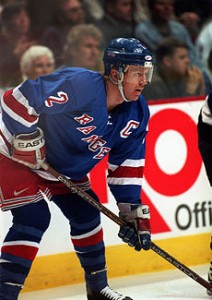Brian Leetch holds the distinction of being the first American-born player to win the Conn Smythe Trophy as Playoff MVP. The 2009 Hall of Fame inductee was one of the best offensive defensemen in the history of the game, and is arguably the finest player in the New York Rangers’ 86-year history. In the words of his Hall of Fame teammate and captain, Mark Messier: “he was magic to play with… he was, in my opinion, and is the greatest Ranger of all time.
Even in such an illustrious career, the 1994 Stanley Cup run may be the highlight. Let’s take a look back at his accomplishments, focusing on that legendary run.
Leetch’s Promising Start
By the time the 1994 Stanley Cup playoffs began, New York Rangers defenseman Brian Leetch was already regarded as one of the best blueliners in the National Hockey League. In six full NHL seasons, Leetch, who turned 26 on March 3rd in 1994, had already accomplished more than most players.
Selected ninth overall by the Rangers in 1986, Leetch was destined for great things. After representing the United States at the 1988 Winter Olympics, he immediately joined the Blueshirts. In his rookie season in 1988-89, the blueliner scored 23 goals and recorded 71 points in 68 games.
That remains the second highest point total ever by a rookie defenseman, trailing only Larry Murphy’s 76 in 1980-81, and Leetch’s 23 goals is the highest ever mark by a rookie blueliner. His terrific debut season earned him the Calder Trophy as the league’s top freshman.
Despite a sophomore slump, Leetch rebounded in 1990-91, registering 72 assists and 88 points. However, the defenseman’s game reached new heights during the 1991-92 season, thanks in large part to the arrival of Messier in Manhattan.
A Norris Trophy and Mike Keenan
Leetch was not only at his best in 1991-92, but he was at the top of the class in the NHL. He became only the fifth defenseman in league history to record 100-plus points in a season, joining Bobby Orr, Denis Potvin, Paul Coffey, and Al MacInnis.
The Rangers’ blueliner scored 22 goals and added 80 assists for 102 points, good enough for ninth in the NHL. Leetch’s 80 helpers are a Rangers single-season record, and he was awarded the Norris Trophy as the best defenseman in hockey for his efforts.
The next season, however, was an injury-riddled one for the Rangers’ assistant captain. Leetch was averaging over a point per game through the first two months of the season, and was poised to have another big campaign. That vision came to a screeching halt during a Rangers win in St. Louis on December 17th. Leetch was tripped up and slid on his stomach into the boards.
The diagnosis was bad, a nerve injury in his neck and shoulder that kept him out of action until early March. To make matters worse, just five games after he returned to the lineup, he had a freak accident. He stepped on a patch of black ice getting out of a taxi cab and broke his fibula. His final stat line for 1992-93 read: 36 GP, 6 G, 30 A, 36 P.
Back at full strength for the 1993-94 season, Leetch was looking forward to a full season on the ice. Although he was healthy, he initially had a tough time earning the trust of the Blueshirts’ new bench boss, the notoriously ill-tempered Mike Keenan.
Keenan made a habit of benching Leetch during games early in the season, and the head coach would often criticize him by screaming, “You’re no Chelios,” referring to Keenan’s former star defenseman in Chicago. Despite the struggles early on, Leetch had an all-star season. He played in all 84 games (a season total adopted briefly by the NHL in the 90s) and totaled 79 points (23 goals and 56 assists) while helping the Blueshirts win their second President’s Trophy in three seasons.
A Legendary Postseason
With momentum on their side and a President’s Trophy in their cabinet, the Rangers were poised for a serious postseason run. But they weren’t coming alone: new deadline additions of Stéphane Matteau, Brian Noonan, Craig McTavish, and Glenn Anderson, who cost beloved Rangers’ veteran Mike Gartner, were poised to make an impact. The Anderson for Gartner trade would turn out to be a swap of future hall of famers.
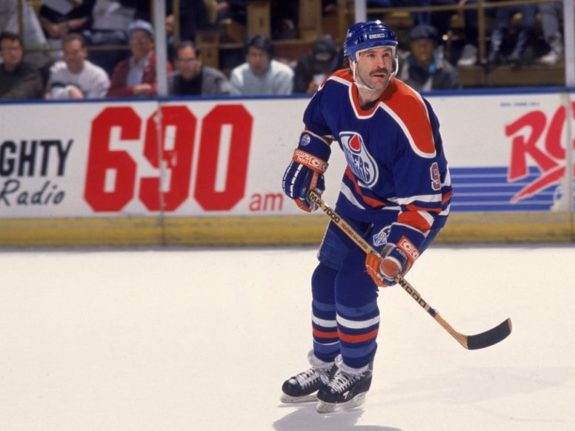
It wasn’t going to be an easy road. Their first-round matchup was against the Rangers’ biggest foe, their crosstown rivals the New York Islanders.
“I think we were scared, to be honest,” Leetch later said of the matchup. “We’d had a hard time over the last couple years winning in Long Island… All the games were tough… We knew they were a good team and they were going to test us.”
The test didn’t ultimately prove too strong: the Rangers scored 22 goals in four games and swept their rivals. Leetch made an immediate impact, collecting eight points in the series, including a four-point night in Game 3, the first of the playoffs in an enemy arena.
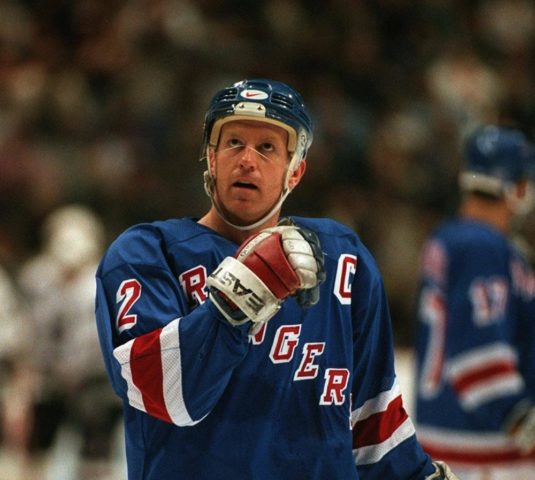
The matchups didn’t get any easier: the Washington Capitals awaited the Rangers in the second round. But once again the Blueshirts disposed of their foe rather easily, beating them in five games. Leetch scored nine more points in the series, and once again had a four-point game, this time in the deciding fifth game.
Two Major Showdowns
The New Jersey Devils
Any hope of a respite after the Capitals evaporated when the Rangers were set to square off with yet another crosstown rival: the New Jersey Devils. Powered by future Hall of Fame goaltender Martin Brodeur in his Calder Trophy winning season. It was an incredibly difficult series.
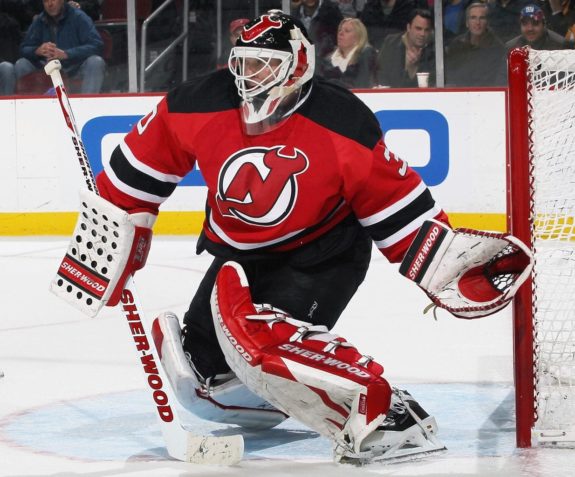
“We had beaten them every game in the regular season, so we had confidence because of that,” Leetch said. “Whereas the first two series, we were able to skate and create opportunities… we knew we would have to be disciplined and willing to play low-scoring games and work out of the corners.”
It was a rough start for Leetch. He was a minus-three with no points in Game 1, his first game without notching a point in the playoffs. The Rangers won the next two games, with Leetch getting points in each, before they lost two in a row, again when he was held scoreless, with a plus-minus of zero and minus-one. In fact, throughout the postseason, the rangers only lost when Leetch’s plus-minus was zero or negative.
With the Rangers down 3-2 in the series, Messier famously guaranteed a Game 6 victory, and Leetch made a big difference, scoring two assists and going plus-four in a 4-2 win. The Rangers outlasted the Devils in Game 7, winning in double overtime. Leetch scored the opening goal, and Matteau, the deadline addition, scored the game winner and punched the Rangers’ ticket to their first Stanley Cup Final since 1979.
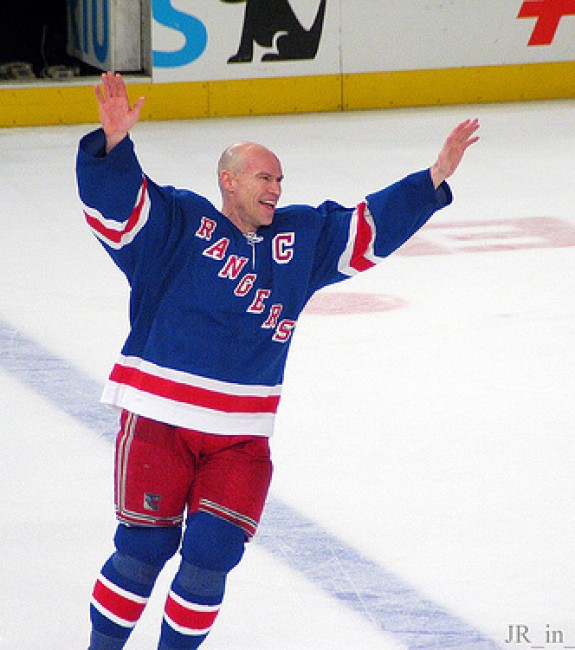
The Vancouver Canucks
On the surface, the Vancouver Canucks, whom the Rangers would meet in the Finals, seemed less intimidating: “We knew there would be more open ice than there was in the New Jersey series,” said Leetch, “and we thought that we could manufacture chances.”
But Game 1, a 3-2 overtime loss, showed them that the ultimate prize wouldn’t come easily. The Rangers would win the next three games, with Leetch scoring seven points, four of them goals, in those contests. The Blueshirts were on the verge of glory, but the Canucks weren’t ready to surrender. They outscored their opponents 10-4 in the next two games, evening the series, with Leetch posting a minus-five in those matchups.
It had all come down to the greatest event in sports: Game 7 of the Stanley Cup Final. Leetch was confident that a win was in the cards:
“They played their best in Game 6, but you would see things that talked about how it’s hard to beat a team three games in a row in the playoffs… so we knew there was a little doubt in their heads.”
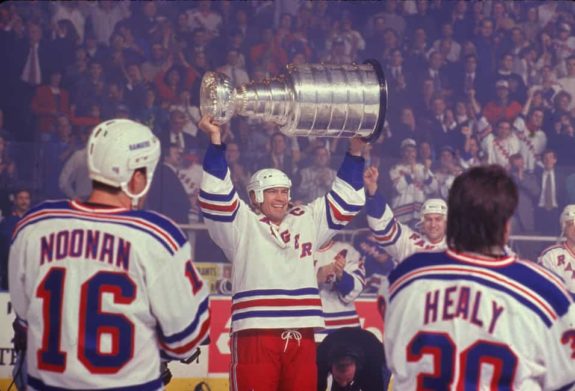
Leetch backed up his confidence by scoring the opening goal, one of three his team would score in the game. The Canucks brought the deficit to one with 15 minutes left in the third period, but the Rangers held on for victory. It was their first championship since 1940, and Leetch was a primary reason why they had won.
A Hall of Fame Legacy
As the postseason leader in assists (23) points (34) plus-minus (plus-19) and game winning goals (4), there was little question that Leetch was the rightful winner of the Conn Smythe Trophy. He became the first American to win the award and remained the only one to take it until Tim Thomas joined him in 2011.
It was the highlight accomplishment of a Hall of Fame career. He would win the Norris Trophy again in 1996-97, and throughout his career would play in the All-Star Game nine different times. He is only the second player in league history, and the only American, to win the Calder Trophy, the Norris Trophy, and the Conn Smythe Trophy, joining Bobby Orr in that rarified air.
Leetch would finish his legendary career with 981 points in 1129 game as a Ranger. He played 76 games with the Toronto Maple Leafs and the Boston Bruins at the end of his career, adding 47 points in those games, to finish with 1028 points in 1205 games.
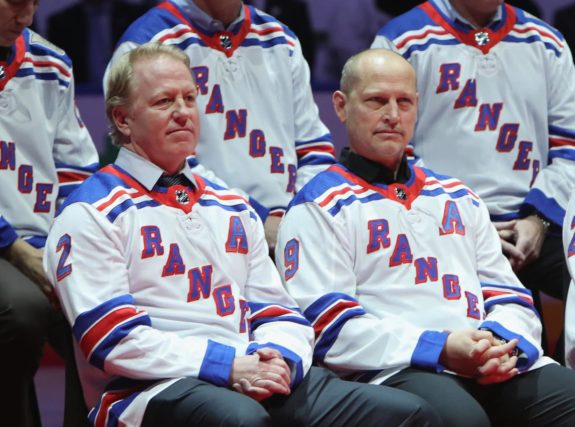
His number 2 was retired by the New York Rangers in 2008, and Messier once again referred to him as the greatest Ranger of all time at the ceremony. He was inducted into the Hall of Fame the following year, becoming the third straight Ranger from that Stanley Cup winning team to be inducted, following Messier in 2007 and Anderson in 2008. He is not only one of the greatest Americans to ever play the game, but he is the greatest player in Rangers history, and his legendary performance in the 1994 playoffs ended a drought half a century in the making.
